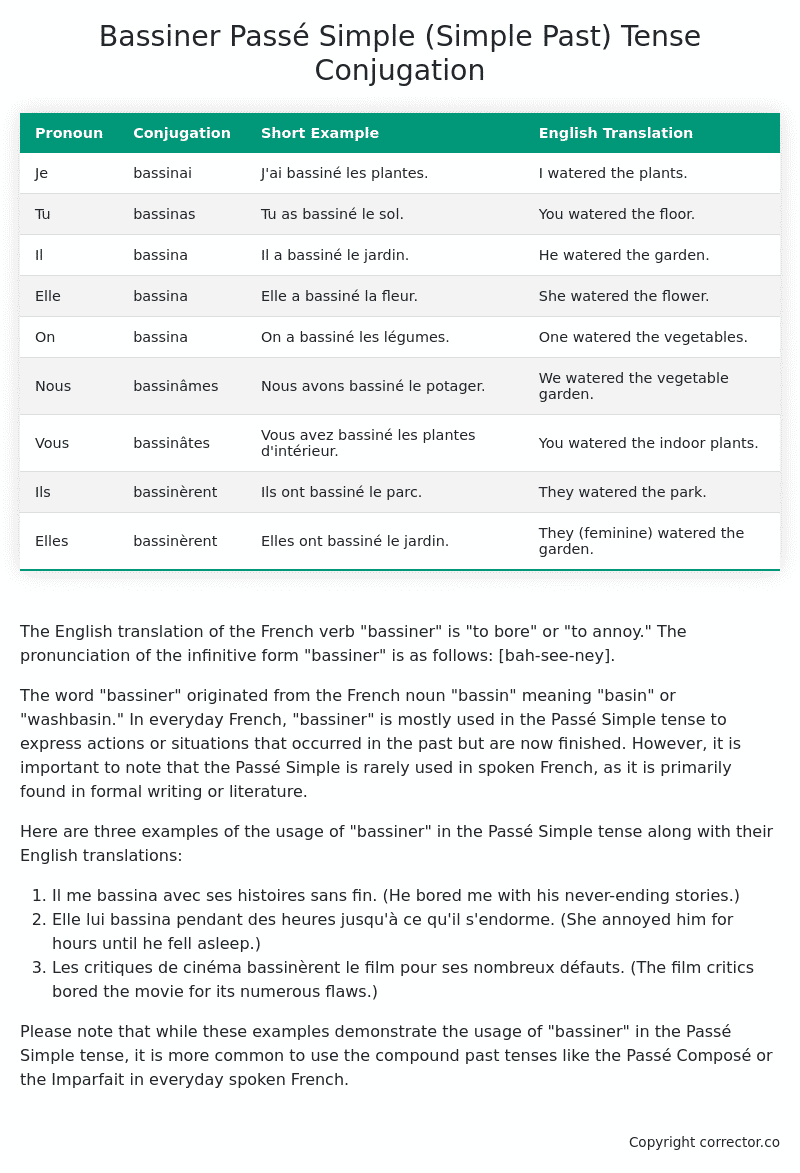Passé Simple (Simple Past) Tense Conjugation of the French Verb bassiner
Introduction to the verb bassiner
The English translation of the French verb “bassiner” is “to bore” or “to annoy.” The pronunciation of the infinitive form “bassiner” is as follows: [bah-see-ney].
The word “bassiner” originated from the French noun “bassin” meaning “basin” or “washbasin.” In everyday French, “bassiner” is mostly used in the Passé Simple tense to express actions or situations that occurred in the past but are now finished. However, it is important to note that the Passé Simple is rarely used in spoken French, as it is primarily found in formal writing or literature.
Here are three examples of the usage of “bassiner” in the Passé Simple tense along with their English translations:
- Il me bassina avec ses histoires sans fin. (He bored me with his never-ending stories.)
- Elle lui bassina pendant des heures jusqu’à ce qu’il s’endorme. (She annoyed him for hours until he fell asleep.)
- Les critiques de cinéma bassinèrent le film pour ses nombreux défauts. (The film critics bored the movie for its numerous flaws.)
Please note that while these examples demonstrate the usage of “bassiner” in the Passé Simple tense, it is more common to use the compound past tenses like the Passé Composé or the Imparfait in everyday spoken French.
Table of the Passé Simple (Simple Past) Tense Conjugation of bassiner
| Pronoun | Conjugation | Short Example | English Translation |
|---|---|---|---|
| Je | bassinai | J’ai bassiné les plantes. | I watered the plants. |
| Tu | bassinas | Tu as bassiné le sol. | You watered the floor. |
| Il | bassina | Il a bassiné le jardin. | He watered the garden. |
| Elle | bassina | Elle a bassiné la fleur. | She watered the flower. |
| On | bassina | On a bassiné les légumes. | One watered the vegetables. |
| Nous | bassinâmes | Nous avons bassiné le potager. | We watered the vegetable garden. |
| Vous | bassinâtes | Vous avez bassiné les plantes d’intérieur. | You watered the indoor plants. |
| Ils | bassinèrent | Ils ont bassiné le parc. | They watered the park. |
| Elles | bassinèrent | Elles ont bassiné le jardin. | They (feminine) watered the garden. |
Other Conjugations for Bassiner.
Le Present (Present Tense) Conjugation of the French Verb bassiner
Imparfait (Imperfect) Tense Conjugation of the French Verb bassiner
Passé Simple (Simple Past) Tense Conjugation of the French Verb bassiner (You’re reading it right now!)
Passé Composé (Present Perfect) Tense Conjugation of the French Verb bassiner
Futur Simple (Simple Future) Tense Conjugation of the French Verb bassiner
Futur Proche (Near Future) Tense Conjugation of the French Verb bassiner
Plus-que-parfait (Pluperfect) Tense Conjugation of the French Verb bassiner
Passé Antérieur (Past Anterior) Tense Conjugation of the French Verb bassiner
Futur Antérieur (Future Anterior) Tense Conjugation of the French Verb bassiner
Subjonctif Présent (Subjunctive Present) Tense Conjugation of the French Verb bassiner
Subjonctif Passé (Subjunctive Past) Tense Conjugation of the French Verb bassiner
Subjonctif Imparfait (Subjunctive Imperfect) Tense Conjugation of the French Verb bassiner
Subjonctif Plus-que-parfait (Subjunctive Pluperfect) Tense Conjugation of the French Verb bassiner
Conditionnel Présent (Conditional Present) Tense Conjugation of the French Verb bassiner
Conditionnel Passé (Conditional Past) Tense Conjugation of the French Verb bassiner
Conditionnel Passé II (Conditional Past II) Tense Conjugation of the French Verb bassiner
L’impératif Présent (Imperative Present) Tense Conjugation of the French Verb bassiner
L’impératif Passé (Imperative Past) Tense Conjugation of the French Verb bassiner
L’infinitif Présent (Infinitive Present) Tense Conjugation of the French Verb bassiner
L’infinitif Passé (Infinitive Past) Tense Conjugation of the French Verb bassiner
Le Participe Présent (Present Participle) Tense Conjugation of the French Verb bassiner
Le Participe Passé (Past Participle) Tense Conjugation of the French Verb bassiner
Struggling with French verbs or the language in general? Why not use our free French Grammar Checker – no registration required!
Get a FREE Download Study Sheet of this Conjugation 🔥
Simply right click the image below, click “save image” and get your free reference for the bassiner Passé Simple tense conjugation!

Bassiner – About the French Passé Simple (Simple Past) Tense
Formation
Usage
Narration
Historical Context
Interactions with other tenses
Passé Composé
Imparfait
Conditional and Subjunctive
Summary
I hope you enjoyed this article on the verb bassiner. Still in a learning mood? Check out another TOTALLY random French verb conjugation!


